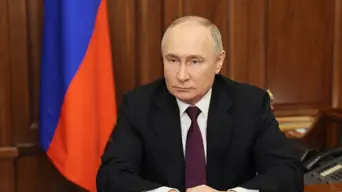Scholz urges Ukraine talks in first call with Putin since 2022
The German leader 'urged Russia to show willingness to negotiate with Ukraine with the aim of achieving a just and lasting peace', his spokesperson said in a statement.

FILE: In this pool photograph distributed by Russia's state agency Sputnik, Russian re-elected President Vladimir Putin addresses the nation following the presidential election, in Moscow on 21 March 2024. Picture: AFP
BERLIN - German Chancellor Olaf Scholz on Friday urged Russian President Vladimir Putin to engage in peace talks with Ukraine, in the first call between the leaders in almost two years.
In the call, Scholz "condemned Russia's war of aggression against Ukraine and called on President Putin to end it and withdraw troops", the chancellor's spokesperson Steffen Hebestreit said.
The German leader "urged Russia to show willingness to negotiate with Ukraine with the aim of achieving a just and lasting peace", Hebestreit added in a statement.
Scholz also stressed "Germany's unwavering determination to support Ukraine in its fight against Russian aggression for as long as necessary".
The call comes at a crucial juncture in the war. Ukrainian troops are coming under pressure and the election of Donald Trump in the United States has cast doubt over Washington's continued support for Kyiv.
The Kremlin said Putin had a "detailed and frank exchange of views over the situation in Ukraine" with Scholz, with the call initiated by the German side.
Putin told Scholz that any agreement to end the war in Ukraine "should take into account the security interests of the Russian Federation" the Kremlin added.
An accord should "proceed from the new territorial realities and, most importantly, address the root causes of the conflict".
UKRAINE CONTACT
Before picking up the phone to Putin, Scholz spoke with Ukrainian President Volodymyr Zelensky, Scholz's spokesman said.
The German and Ukrainian leaders spoke "beforehand and will do so again after the conversation with the Russian president", the spokesman said.
The call between Scholz and Putin was the first time the two have been in contact since December 2022.
During the hour-long call, Scholz "particularly condemned the Russian air strikes against civilian infrastructure in Ukraine", said a German government source.
"He made it clear that sending North Korean soldiers to Russia for combat missions against Ukraine would lead to a serious escalation and expansion of the conflict," the source added.
Berlin would keep NATO and European Union allies informed over the talks, while the German and Russian leaders had "agreed to remain in contact".
Scholz's December 2022 call with Putin was the last known phone call between the Kremlin chief and the leader of a major Western country.
Putin has spoken to few NATO and Western leaders since 2022, when the EU and the US imposed massive sanctions on Russia for launching its shock Ukraine offensive.
Within the NATO bloc, Putin maintains contact with Hungarian Prime Minister Viktor Orban - who is critical of Western policy on Russia - and with Turkish President Recep Tayyip Erdogan.
TRUMP FACTOR
Ukraine is bracing for the most difficult winter so far in the war, which began in February 2022 when Russia launched its full-scale invasion.
Much of Ukraine's energy infrastructure has been destroyed by Russian bombardments and Kyiv's troops are increasingly on the back foot.
Germany has been one of Ukraine's biggest military supporters, second only to the United States in the aid it has sent to Kyiv.
But the election of Trump, who criticised aid to Ukraine on the campaign trail, has called into question Washington's continued support.
Trump said on the campaign trail that he could end the fighting within hours and has indicated he would talk directly with Putin.
The Kremlin has denied reports that Putin and the president-elect of the United States recently discussed the Ukraine conflict by phone.
Scholz, who did speak with Trump following his election win, told the German daily Sueddeutsche Zeitung on Friday that the incoming US leader had a "more nuanced" position on the conflict than was commonly thought.
Following the Putin-Scholz call, Polish Prime Minister Donald Tusk said he had been updated by the German leader on the discussion.
Tusk was "satisfied" that Scholz had "reiterated the Polish position: 'Nothing about Ukraine without Ukraine'," he said on social media platform X.